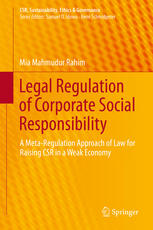

Most ebook files are in PDF format, so you can easily read them using various software such as Foxit Reader or directly on the Google Chrome browser.
Some ebook files are released by publishers in other formats such as .awz, .mobi, .epub, .fb2, etc. You may need to install specific software to read these formats on mobile/PC, such as Calibre.
Please read the tutorial at this link: https://ebookbell.com/faq
We offer FREE conversion to the popular formats you request; however, this may take some time. Therefore, right after payment, please email us, and we will try to provide the service as quickly as possible.
For some exceptional file formats or broken links (if any), please refrain from opening any disputes. Instead, email us first, and we will try to assist within a maximum of 6 hours.
EbookBell Team

4.4
12 reviewsEven though Corporate Social Responsibility (CSR) has become a widely accepted concept promoted by different stakeholders, business corporations' internal strategies, known as corporate self-regulation in most of the weak economies, respond poorly to this responsibility. Major laws relating to corporate regulation and responsibilities of these economies do not possess adequate ongoing influence to insist on corporate self-regulation to create a socially responsible corporate culture.
This book describes how the laws relating to CSR could contribute to the inclusion of CSR principles at the core of the corporate self-regulation of these economies in general, without being intrusive in normal business practice. It formulates a meta-regulation approach to law, particularly by converging patterns of private ordering and state control in contemporary corporate law from the perspective of a weak economy. It proposes that this approach is suitable for alleviating regulators' limited access to information and expertise, inherent limitations of prescriptive rules, ensuring corporate commitment, and enhance the self-regulatory capacity of companies.
This book describes various meta-regulation strategies for laws to link social values to economic incentives and disincentives, and to indirectly influence companies to incorporate CSR principles at the core of their self-regulation strategies. It investigates this phenomenon using Bangladesh as a case study.